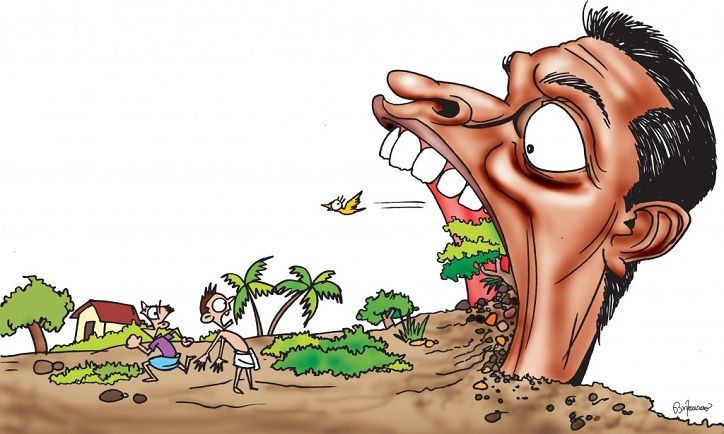Afghan people are facing numerous challenges. If the counting of these problems began, the list will shape a multi-chapter book, full of the stories about the government’s failures. From elimination of poppy to fighting corruption, the leaders failed on every front. Since 2001 the problems remain the same. However, the intensity changes with passage of time. Insecurity precedes poverty, closure of schools precedes failed polio campaigns and poor healthcare services, and vice versa. At one point it is elections that trouble the nation the most. At the other point it is insecurity that haunts them. Sometimes, it is nepotism that perturbs the common people and most of the time it is unemployment and growing insurgency that challenge them.
Currently, it is usurpation of the state-owned lands which is making headlines. It seems that land grabbing is becoming more serious problem than insecurity. Take for instance the grabbing of plots in a township in eastern Nangarhar. Around 3,000 plots had been usurped by powerful individuals in the Chamtali Township in the province. The township, situated on the outskirts of Jalalabad, is supposed to accommodate the returnees. Interestingly, 37.5 percent of the township is occupied by the land grabbers as the housing scheme consists of 8,000 plots. The percent is shocking and eye opener. Looking at these figures, the provincial governor and the central government cannot claim that they are doing well. The harsh reality is that they have failed in protecting rights of the public.
Similarly, powerful people are grabbing government lands in Ghazni province as well, but the authorities have turned a blind eye. Abdul Jamay Jamay, a member of the provincial council, said that 15,000 acres of land had been usurped by mafia groups in Ghazni province. Khalilullah Hottak, a tribal elder in the province, on Monday said that land grabbing has become an established practice in Ghazni. He said that public properties are not only usurped in Ghazni City but also in Jaghori, Malistan, Nahur, Gilan, Maqur, Andar and Deh Yak districts.
Retaking of these lands has become a wild goose chase. On Sunday the Afghanistan Freedom House said that 1.95 million acres of state lands had been grabbed. These lands had been grabbed in 18 different provinces. In other words, state-owned lands are usurped uninterruptedly in 52.94 percent of the country. According to estimates worth 22 billion dollars lands had been grabbed without any fear of prosecution. Based on the statistics of to the Independent Land Authority and the Special Parliamentary Commission, around 1.2 million acres of state lands were usurped in 34 provinces.
The data shows that the authorities had failed to retake the usurped lands and punish the illegal occupants. The challenge will continue to make headlines if serious steps were not taken.
 Afghanistan Times
Afghanistan Times




